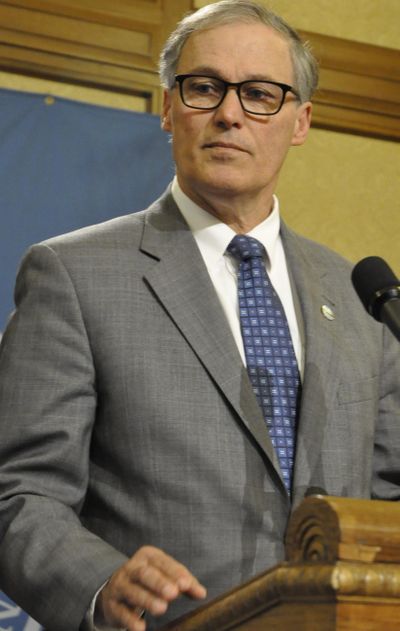Inslee threatens to veto bills if budget deal delayed

OLYMPIA – With fewer than four days left in the regular legislative session, Washington Gov. Jay Inslee threatened to kill bills that have passed so far if lawmakers don’t reach a budget agreement by Thursday night.
“I will not entertain any delays,” Inslee said at a Monday afternoon news conference. “Your bills are going to get vetoed if you don’t do your job and get a budget by Thursday.”
After meeting with legislative leaders, Inslee said budget negotiators have made some progress but should be closer to an agreement. He declined to give details about the biggest points of disagreement, other than “money.”
“You may waterboard me, but I’m not going to say more about negotiations,” he said.
Legislators have been working since January to update the state’s two-year operating budget, which they approved in a third overtime session last year. The House budget spends more on state programs and proposes closing or reducing six tax exemptions. The Senate budget has lower increases on most programs and keeps those tax exemptions, but receives some help on the revenue side from a controversial plan to combine two of the state’s oldest pension plans.
If lawmakers need more time, Inslee said he would bring them back on Friday for a special session. But if they don’t have a budget agreement before midnight Thursday, he said he would veto any bill that was reaching the five-day limit in which it can become law without his signature.
Under state law, bills passed during most of the session become law even without his signature five days after they reach the governor’s office, unless he vetoes them.
Senate Majority Leader Mark Schoesler said he remains optimistic that lawmakers will reach an agreement before Thursday. Told about Inslee’s veto threat, he said he hoped they weren’t bills the governor wanted.
Among the bills Inslee has said he supports that are tied up in budget negotiations is one that would make a driver’s fourth DUI in 10 years a felony. Current state law doesn’t impose a felony until the fifth DUI, which is the least strict among 46 states that have felony DUI laws.
Sen. Mike Padden, R-Spokane Valley, said many states – including Idaho and Oregon – charge a felony for the third DUI arrest.
Monday morning, lawmakers from both parties called for tougher state DUI laws, but said the decision is in the hands of budget negotiators to come up with the estimated cost of making the fourth DUI a felony – about $10 million every two years in court and sentencing expenses.
The legislators disagreed whether the state should raise taxes to accomplish that goal.